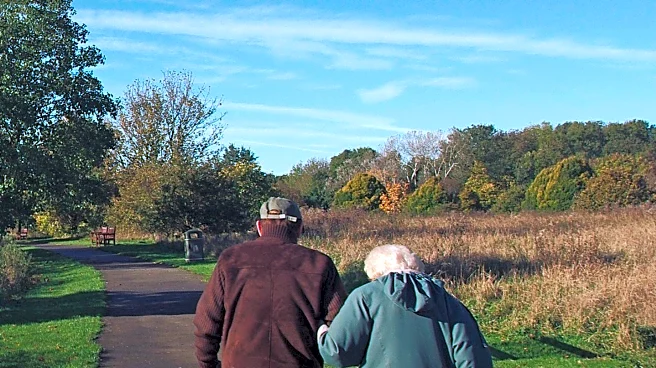What's Happening?
A study published in Nature Medicine indicates that walking a few thousand steps daily can slow cognitive decline in older adults at increased risk of Alzheimer's disease. The research involved nearly
300 participants aged 50 to 90, monitored over an average of nine years. Participants who walked between 3,000 to 5,000 steps daily showed reduced cognitive decline compared to those with less physical activity. The benefits peaked at 5,000 to 7,500 steps, with significant slowing of mental decline observed. The study highlights the established link between exercise and dementia, providing insights into how physical activity may influence proteins implicated in Alzheimer's.
Why It's Important?
This study reinforces the role of physical activity in reducing Alzheimer's risk, offering a practical approach to dementia prevention. By identifying a specific range of steps that can slow cognitive decline, the research provides valuable guidance for older adults and healthcare providers. The findings could lead to more personalized exercise recommendations, potentially improving cognitive health and reducing the burden of Alzheimer's on individuals and healthcare systems. As exercise is accessible and cost-effective, promoting daily walking could have widespread public health benefits, enhancing quality of life for aging populations.
What's Next?
The study's results may encourage further exploration into the biological mechanisms by which exercise affects brain health, particularly in relation to Alzheimer's disease. Researchers may investigate the impact of different types of physical activity and their interactions with other risk factors for dementia. Healthcare providers might begin to incorporate these findings into patient care strategies, advocating for regular walking as a preventive measure. Public health initiatives could leverage this information to promote physical activity among older adults, potentially leading to broader societal benefits.
Beyond the Headlines
The research emphasizes the importance of personalized health interventions, as the benefits of walking were most pronounced in individuals with specific protein buildups in the brain. This suggests a need for more targeted approaches to Alzheimer's prevention, considering individual risk profiles. The study may also influence societal perceptions of aging and physical activity, highlighting the role of exercise in maintaining cognitive health and independence. Ethical considerations may arise regarding equitable access to exercise opportunities for all older adults, particularly those with mobility challenges.









